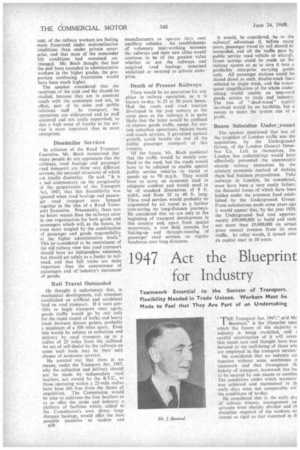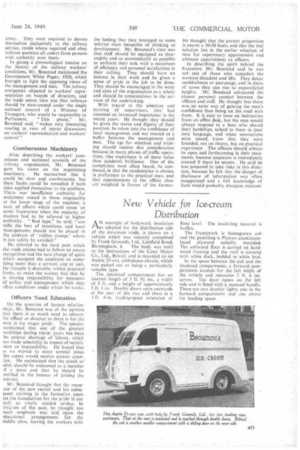1947 Act the Blueprint
Page 24

Page 25

If you've noticed an error in this article please click here to report it so we can fix it.
for Industry
Teamwork Essential to the Success of Transport. Flexibility Needed in Trade Unions, Workers Must be Made to Feel that They Are Part of an Undertaking
" THE Transport Act, 1947," se Td Mr Benstead," is the blueprint upor
which the future of the majority o: industry is being modelled, and r careful examination of it will revea that much care and thought have beer devoted to the well-being of those win are employed in the transport service.'
He considered that no industry cal function without some semblance o teamwork and that throughout tb. history of transport, teamwork has hal to be secured by one means or anothet The conditions under which teamwor was achieved and maintained in th early days were not comparable wit the conditions of to-day.
He considered that in the early day of railway history, management an servants were sharply divided and th discipline required of the workers WE almost as rigid as that exercised in th
army. They were required to devote themselves exclusively to the railway service, reside where required and obey without question all orders from persons with authority over them.
In giving a chronological treatise on the history of the railway workers' conditions, Mr. Benstead mentioned the Government White Paper, 1920, which brought to light the opposing views of the management and men. The railway companies objected to workers' representation on boards of directors, and the trade union view was that railways should be state-owned under the single national control of a Minister of Transport, who would be responsible to Parliament. "This phase," Mr. Benstead said, "makes very interesting reading in view of recent discussions on workers' representation and workers' cont rol "
Cumbersome Machinery
After describing the workers' committees and sectional councils of the railway organization, Mr. Benstead gave his views on the negotiating machinery. He maintained that it could be slow and cumbersome, but these faults could be remedied if both sides aPplied themselves to the problem. There was insufficient authority for settlement vested in those responsible at the lower stage of the machine, it state of affairs which could cause an acute frustration when the majority of matters had to be referred to higher authority. " Red 'tape," he said, "can stifle the best of intentions, and local managements should not be placed in the position of rubber stamps' where it can safely be avoided."
He referred to the hard path which the trade unions had to follow to secure recognition and the sure change of spirit which accepted the employee as some thing more than a servant, cog or unit. He thought it desirable, within practical limits, to make the worker feel that he is sharing responsibility for measures of policy and management which may affect conditions under which he works.
Officers 'Need Education
On the question of human relationships, Mr. Benstead was of the opinion that there is' as much need to educate the officer or director as there is for the man in the wages grade. The speaker maintained that one of the greatest iardships during recent years has been he general shortage of labour, which as made selectivity in respect of recruitnent an impossibility. He hoped that is we moved to more normal times this aspect would receive greater attention.. He maintained that the youth or' idult should be welcomed as a member xf a team and that he should he nstilled in the honour of joining the nd us try.
Mr. Benstead thought that the recejiion of the new recruit and his subsejuent training in the formative years ire the foundations for the pride in Our :raft so vitally needed td-day. In :ritieism of the past, he thought too much emphasis was laid upon the :ducational arrangements for the niddie class, leaving the workers with the feeling that they belonged to some inferior class incapable of thinking or development. Mr. Benstead's view was that staff should be equipped as thoroughly and as economically as possible to perform their task with a maximum of efficiency and personal satisfaction in their calling. They should have an interest in their work and be given a sense of pride in the job to be done. They should be encouraged in the work and aims of the organization as a whole and should be conscientious in the services of the undertaking.
With regard to the selection and training of supervisors, this had assumed an increased importance in the recent years. He thought they should be given the status and dignity of their position, be taken into the confidence of local management and not treated as a buffer between the management and men. The age for selection and training should receive due consideration because, in many phases of traffic operations, ripe experience is of more value than academic brilliance. One of the complaints most often heard, he continued, is that the academician is chosen in preference to the practical man, and that appointments to the officer class are weighted in favour of the former. He thought that the correct proportion is nearer a 50-50 basis, and that the real solution lies in the earlier selection of men for supervisory appointment and ultimate appointment as officers.
In describing the spirit behind the Executive, Mr. Benstead said he was no one of those who considers the workers decadent and idle. They detest snobbishness or patronage, and in times of stress they can rise to unparalleled heights. Mr. Benstead advocated the closest personal contacr between the officers and staff. He thought that there was no surer way of gaining the men's confidence than being on the road with them. It is easy to issue an instruction from an office desk, but the men would always respond to a boss who shared their hardships, talked to them in their own language, and when instructions were issued, knew that they were founded, not on theory, but on practical experience. The officers should always be open and forthcoming in their statements, because suspicion is immediately created if there be secrets. He said he was prepared to take risks in this direction, because he felt that the danger of disclosure of information was often exaggerated and a full knowledge of facts Would probably dissipate mistrust.




























